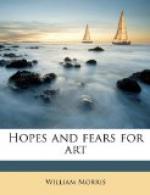That faith comforts me, and I can say calmly if the blank space must happen, it must, and amidst its darkness the new seed must sprout. So it has been before: first comes birth, and hope scarcely conscious of itself; then the flower and fruit of mastery, with hope more than conscious enough, passing into insolence, as decay follows ripeness; and then—the new birth again.
Meantime it is the plain duty of all who look seriously on the arts to do their best to save the world from what at the best will be a loss, the result of ignorance and unwisdom; to prevent, in fact, that most discouraging of all changes, the supplying the place of an extinct brutality by a new one; nay, even if those who really care for the arts are so weak and few that they can do nothing else, it may be their business to keep alive some tradition, some memory of the past, so that the new life when it comes may not waste itself more than enough in fashioning wholly new forms for its new spirit.
To what side then shall those turn for help, who really understand the gain of a great art in the world, and the loss of peace and good life that must follow from the lack of it? I think that they must begin by acknowledging that the ancient art, the art of unconscious intelligence, as one should call it, which began without a date, at least so long ago as those strange and masterly scratchings on mammoth-bones and the like found but the other day in the drift— that this art of unconscious intelligence is all but dead; that what little of it is left lingers among half-civilised nations, and is growing coarser, feebler, less intelligent year by year; nay, it is mostly at the mercy of some commercial accident, such as the arrival of a few shiploads of European dye-stuffs or a few dozen orders from European merchants: this they must recognise, and must hope to see in time its place filled by a new art of conscious intelligence, the birth of wiser, simpler, freer ways of life than the world leads now, than the world has ever led.
I said, to see this in time; I do not mean to say that our own eyes will look upon it: it may be so far off, as indeed it seems to some, that many would scarcely think it worth while thinking of: but there are some of us who cannot turn our faces to the wall, or sit deedless because our hope seems somewhat dim; and, indeed, I think that while the signs of the last decay of the old art with all the evils that must follow in its train are only too obvious about us, so on the other hand there are not wanting signs of the new dawn beyond that possible night of the arts, of which I have before spoken; this sign chiefly, that there are some few at least who are heartily discontented with things as they are, and crave for something better, or at least some promise of it—this best of signs: for I suppose that if some half-dozen men at any time earnestly set their hearts on something coming about which is not discordant with nature, it will come to pass one day or other; because it is not by accident that an idea comes into the heads of a few; rather they are pushed on, and forced to speak or act by something stirring in the heart of the world which would otherwise be left without expression.




